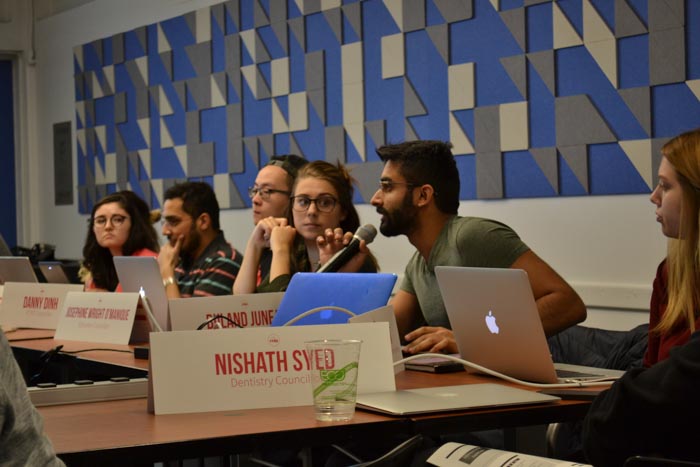At its Nov. 16 meeting, the Students’ Society of McGill University (SSMU) Legislative Council passed the Motion for Nominating Committee of the Board of Directors to Undertake the Selection of Future Board Members Anonymously and the Motion to Amend the Standing Rules to ease the deadlines for presenting motions. Faculty Councillor Anthony Koch was nominated to sit on the Special Committee on Anti-Semitism, which will report to Council in Winter 2018.
Ollivier Dyens and Council talk Governance reform
The first major topic of the session was governance reform. Ollivier Dyens, deputy provost (Student Life and Learning), spoke to Council on this matter before the call to order.
Dyens explained that responsibility for student mental health falls not only on the university, but on students, who must work to cultivate a supportive environment for each other. To Dyens, clarifying SSMU’s constitution is essential to reducing conflicts between students. He suggested hiring an external party to lead the charge in reforming SSMU’s governance structure.
“You guys are going through a turbulent period,” Dyens said. “Your own constitution seems to be, at certain moments, unclear [….] As a university, we want to see SSMU survive. We want to see SSMU together, and being a place where things are healthy for students and debate.”
Council later debated the Motion to Call a Special Referendum Period, which proposed an additional referendum later this month to consider a question regarding constitutional reforms. As the mover of the motion, SSMU Vice-President (VP) External Connor Spencer conceded that the question should be moved to the Winter 2018 Referendum, following concerns over voter burnout within SSMU’s membership. In the interim, she called for Council to commit to starting a larger conversation on governance reform in order to prevent similar issues from recurring every year.
“We need to start having a very large and very long conversation about what governance at SSMU is, and what we’re expecting, and where all the holes are,” Spencer said. “I would really like to pitch […] a commitment to start a larger conversation about [SSMU’s governance structure within…] this body, because we’re all the elected representatives from all the different faculties, and we can make sure our students’ voices are heard within that.”
Following the debate, rules were suspended to add a Motion to Investigate a Committee on Governance Reform, which carried. Council decided that executives and councillors would first look into the options available for starting the process of governance reform, and then determine whether creating an internal committee would be the best solution. VP University Affairs Isabelle Oke explained her stance that more research is necessary before a committee is formed.
“Committees as a first step are one option, [but] I don’t think it’s our only option moving forward,” Oke said. “What I’m suggesting is some kind of mandate, for somebody […] to put together all of the options that we can actually take as a council moving forward, and what resources we’re working with as well.”
Motion for selecting future Board of Directors members anonymously passes
Council voted to remove applicants’ names from applications for future Board of Directors (BoD) seats, through every step of the nominating process until the interview stage. The motion passed with 27 votes in favour, with an amendment added to remove other identifying information irrelevant to the applicant’s qualifications for the position.
While discussing this motion, Council members advocated for the additional need to create a broader policy on hiring processes, which it does not have. SSMU is seeking to fill an equitable hiring position to investigate current hiring practices and alter them for accessibility and transparency.
“This [motion] is an interim step to try and deal with all of the cases that come to the Society now until we have the research that will help us have more rigorous and sustainable practices in our Society,” Oke said.









